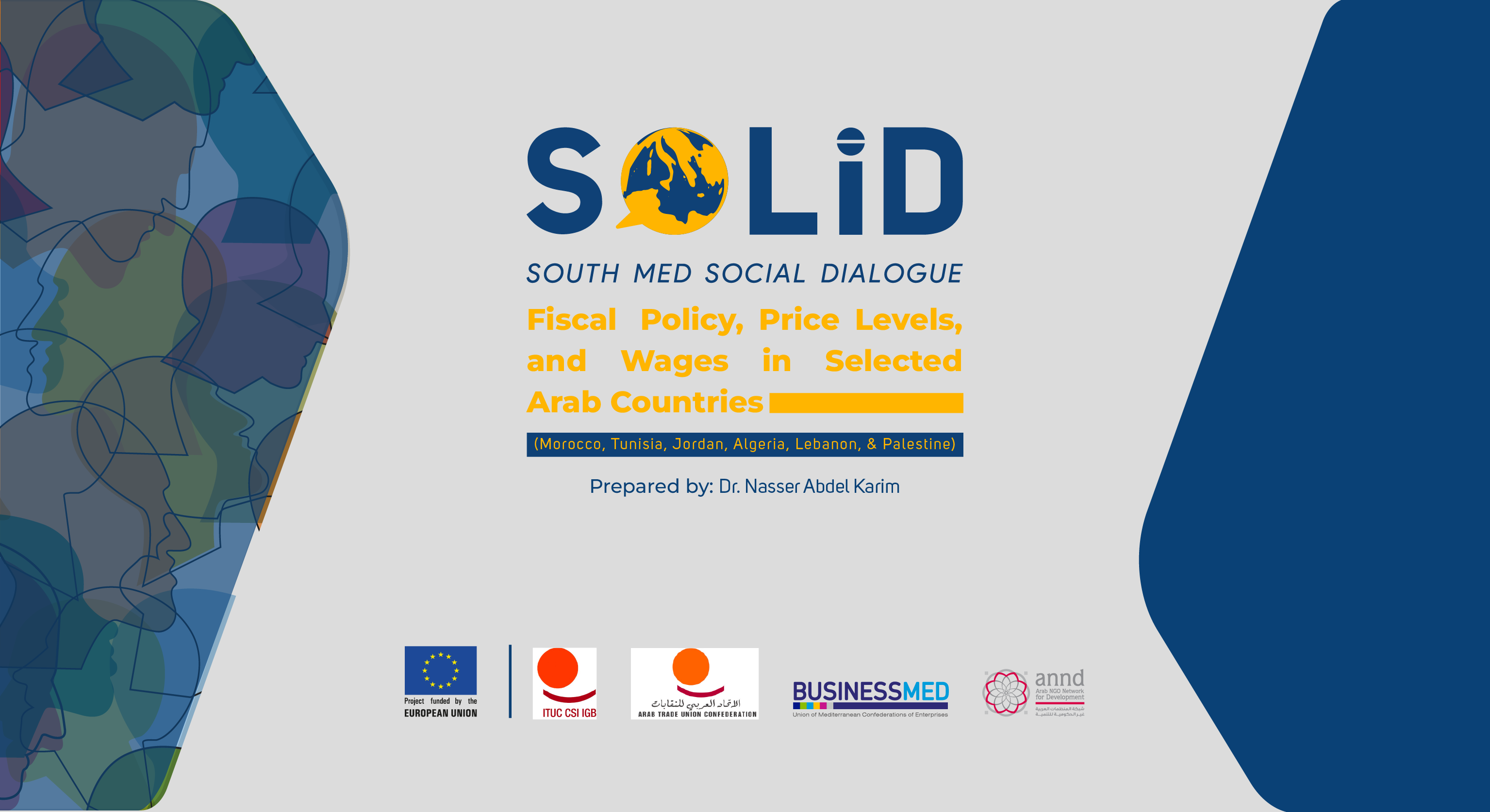
Fiscal Policy, Price Levels, and Wages in Selected Arab Countries - Dr. Nasser Abdel Karim

Fiscal Policy, Price Levels, and Wages in Selected Arab Countries - Dr. Nasser Abdel Karim
(Morocco, Tunisia, Jordan, Algeria, Lebanon, and Palestine)
Please click here to read the full report
Executive Summary
This report aims to infer government interventions that contribute to overcoming chronic and more recent challenges and crises. It focuses on financial policies and actions adopted by some Arab countries (especially Morocco, Tunisia, Jordan, Algeria, Lebanon, and Palestine) to drive the financial policy toward achieving the state’s economic goals and sustainable development. This report's significance stems from its focus on issues that concern Arab citizens and directly impact their daily lives. Such matters require that countries work to reform and develop their financial policies, using various tools that help achieve economic growth and paying attention to all segments of society, especially the poor and marginalized groups. Finally, this report utilizes a descriptive, analytical, and deductive approach, reviewing and comparing relevant data and analysis from the selected countries.
The report's main conclusions are the following:
1- There are many commonalities in fiscal policy in the six countries covered in the report, with their focus on stimulating economic growth and improving the standard of living. However, the countries differ in their methods of fiscal policy implementation. For example, some countries impose income and sales taxes to finance public spending. In contrast, others rely on external borrowing (such as Tunisia).
2- These countries face common challenges, such as increasing public debt, inflation, and rising energy and food prices. Some countries face unique challenges, such as outbreaks of epidemics and internal conflicts.
3- The six countries are similar in the composition of their public revenues. They often rely on several revenue generation sources. However, taxes remain the primary source of generating public revenues in these countries. Tax revenues constitute a significant portion of public revenues and grants in all six countries. They exceed two-thirds of revenues in five countries (Morocco, Tunisia, Lebanon, Jordan, and Palestine) while constituting about 40% in Algeria.
In 2021, non-tax revenues comprised about 11.7% of the total revenues for the selected Arab countries combined. However, their composition varies by country and highly depends on their particular economy and vital sectors.
4- Some countries receive international aid from donor countries and international organizations. This aid is an essential source of public revenues and financing vital projects in some countries. However, this aid has been decreasing (as a percentage of public revenues) year after year; it decreased from about 17% in 2017 to about 7% in 2021. In Jordan, it decreased slightly from about 8% in 2017 to 7.6% in 2021.
5- Current spending makes up most of the public expenditures of the Arab countries combined. Between 2017 and 2021, it increased from 80.3% to 86.1%, while capital spending decreased during the same period from 19.7% in 2017 to 13.9% in 2021. The high rate of current expenditures indicates the weakness of fiscal policy and its low economic impact.
6- Between 2017 and 2021, the six countries suffered from a budget deficit. However, its value and share of GDP varied. In 2021, the highest deficit was recorded in Lebanon, reaching 18.4%, followed by 12.4% in Algeria, then 7.5% in Tunisia. The other three countries (Jordan, Palestine, and Morocco) were close, with a share between 5.2 and 5.5%.
7- The total public debt increased in the six countries. The most significant increase was in Lebanon, which faces a stifling economic crisis and a sharp deterioration in the value of the currency and the standard of living. Public debt exceeded the GDP in Jordan, Tunisia, and Lebanon. It comprised about 90% of the GDP in Morocco, about 57% in Algeria, and about a fifth of the GDP in Palestine.
8- Inflation increased globally, including in Arab countries, for various reasons, including oil price fluctuations, climate change, and geopolitical factors such as the Ukrainian-Russian crisis. Arab countries were significantly impacted, especially regarding food security and tourism, especially in Tunisia and Morocco. The Covid-19 crisis had a significant impact on supply chains and transportation. The recovery from the pandemic also led to higher inflation rates due to increasing consumer demand. The matter has also become more complicated in Arab countries concerning food security, fiscal space, and the local currency exchange rate.
9- Wages in Arab countries did not react to the significant rise in inflation; they "crawl" as inflation rates "run." In the past few months, demonstrations denouncing high prices were on the rise in many Arab and non-Arab countries, in which protesters demanded the improvement of wages, which had stagnated for years amid a significant increase in the cost of living, especially the rise in the price of basic materials. In 2022, wages in Arab countries witnessed a slight increase of 1.2%, compared to 0.5% in 2021 and 0.8% in 2020. In Morocco, wages decreased by 2.6% in 2020, while they increased slightly in Jordan by 0.1% in 2020.
The main reform proposals are as follows:
- Fiscal Policy: The target countries must start improving tax justice. This process requires changing the budget style from budgeting items to budgeting programs and performance; applying strict rules to combat all forms of corruption and tax evasion in tax departments; placing more emphasis on collecting direct tax revenues (income and wealth) instead of indirect taxes (consumption taxes); redesigning tax incentives to target not only significant investments, but also small and medium-sized companies, which represent more than 95% of businesses in these countries; reconsidering the current tax base to include non-traditional and unproductive activities such as real estate deals and speculation in financial markets; expanding the circle of community participation, and prioritizing dialogue and discussion with social groups affected by the tax law.
- Limited financial resources: The efficiency of public spending must be improved, which requires restructuring government spending by reallocating more resources to public investments, reconsidering the share of wages in total spending (which is very high), and increasing financial resources allocated to social security and service programs that benefit the poor, reducing or rationalizing government spending on weapons and security, and directing any financial surpluses to social services and economic empowerment.
- The permanent deficit and continuing high public debt could be avoided by focusing on providing non-traditional financial tools to finance the development process, programs, and projects, automatically reducing countries' need to borrow from within or abroad. This group includes several innovative financing tools that are not sufficiently implemented in the Arab countries, mainly in terms of converting debt into an ownership instrument in what is known as debt-to-equity swaps, securitization, Islamic bonds (sukuk), activating partnerships between the private and public sectors, and diaspora bonds.
- Prices and Inflation: Monetary policy effectiveness to combat inflation cannot coexist with high public debt. Governments must work on activating monetary policies to avoid the spiral of rising prices and rising wages. Banks must increase communication with all sectors to establish more flexible economic expectations and improve understanding of monetary policy tools.
- Wages and the Labor Market: Salaries and wages can be improved by improving the business environment and increasing productivity, companies’ commitment to governance principles, strengthening the role of labor organizations and providing them support and encouragement from governments and civil society, setting a minimum wage, improving the social welfare structure, applying fair taxes that protect the poor and middle classes and reduce social inequality, focusing on employing youth and providing them with job opportunities, and promoting social dialogue and consultation with labor organizations, workers, employers, and civil society.
Please click here to read the full report
Dr. Nasser Abdel Karim
Recent publications

